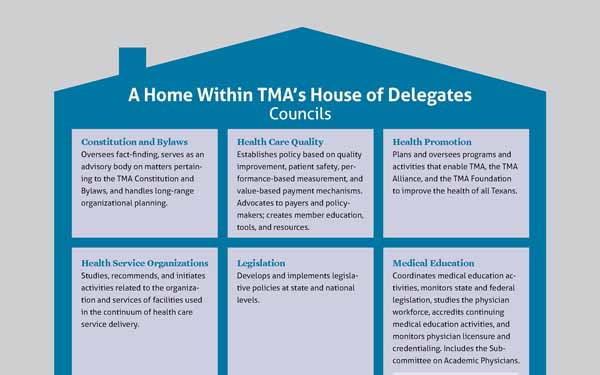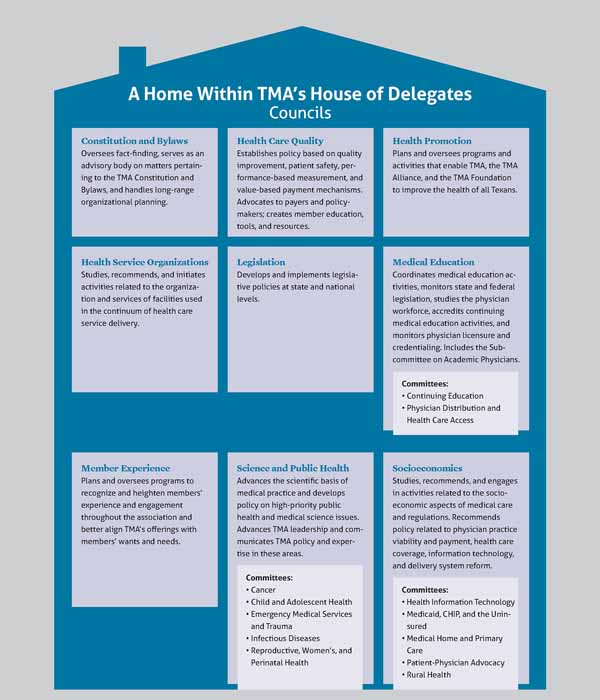
As a new member of the Texas Medical Association’s Council on Health Care Quality, Austin internist Antoine Pham, DO, is ready to fight for organized medicine – even if it means attending a late-night meeting or two.
Those meetings include a wide swath of representation of long-time practicing physicians, residents, and medical students.
“We see Texas medicine at all levels,” he said. “We also see a lot of young children and pets photobomb the Zoom call.”
Jesting aside, Dr. Pham’s council is charged with the serious task of generating TMA policy that advocates for the best quality of care for patients and the fair treatment of physicians, particularly in the evolving realm of value-based care.
Involvement in TMA “has opened my eyes to the amount of physician involvement around the state of Texas, throughout all sorts of levels or walks of life,” he said. “I've already had lots of opportunities to meet and interact with physicians in the state of Texas who are focused on supporting organized medicine.”
With a finger on the pulse of health care, TMA’s nine councils and 12 standing committees work through grassroots advocacy and collaboration to initiate policies and programs that support Texas patients and physicians and provide solutions to the challenges they encounter.
The groups convene to discuss action items during TMA’s fall, winter, and TexMed conferences.
At its annual meeting during TexMed, TMA’s policymaking body, the House of Delegates, directly relies on its councils and committees to help shape TMA policy, which in turn gives the association the direction it needs to carry out its advocacy at the state and federal levels.
New council and committee members are selected by TMA’s president based on their experience and area of expertise. Physicians can either apply or be recommended by their county medical society.
The pathway to joining TMA’s governance often begins with one of the 110 county medical societies and 26 specialty societies of Texas, where physicians become acquainted with regional or specialty health care issues that play into the policies councils and committees recommend.
“If you’re starting out, be active in your county. That way you can learn the processes [of organized medicine] and learn what’s going on,” said Gregory Fuller, MD, chair of TMA’s Council on Socioeconomics.
In fact, the county level is where the various prior-authorization-reduction resolutions originated before they became the policies TMA needed to advocate for reforms at the Texas Capitol. The result: the 2019 “gold-card” law, House Bill 3459, which set a national precedent for other states to follow.
“It was the first law in the nation of its kind,” said Fort Worth radiologist Tilden Childs, MD, chair of TMA’s Council on Legislation. “Other states called for advice on how we did it, so they could implement it as well. It’s a trendsetter in the country.”
Kathryn Clark, TMA director of health care quality, says prior experience like county medical society involvement is helpful, but physicians’ clinical expertise is often qualification enough. With Dr. Pham, for instance, his passion for patient care and experience treating a variety of patient populations was all it took to fit right in.
“We love new blood,” she said.

Guiding TMA
Council and committee members are tasked with multiple responsibilities, from advocacy to education. Their general responsibilities include:
- Reviewing TMA policy within their specific subject area;
- Identifying critical issues and providing recommendations;
- Producing educational programs;
- Contributing to TMA communication and outreach;
- Mentoring the next generation of physicians (student, resident, and fellow members); and
- Providing legislative testimony.
The Council on Legislation, for instance, identified 10 priorities to guide TMA through the 2023 legislative session, Dr. Childs says. (See “On Guard for the Patient-Physician Relationship,” January/February 2023 Texas Medicine, pages 10-25, www.texmed.org/LegePreview.)
“It’s an honor to be on one of these councils,” Lubbock internist and pulmonary disease specialist Cynthia A. Jumper, MD, said in a video TMA produced explaining the association’s governance process (tma.tips/WhoRunsTMA). The TMA board trustee also has served on the councils on Legislation and Medical Education, among other roles.
“You are picked for your area of expertise, and that’s an honor in itself, but it also brings along a responsibility. The responsibility of helping to guide the Texas Medical Association,” she said.
Committees comprise about a dozen members, while council membership can range to about 20 participants. Council and committee chairs serve one two-year term. All standing committees report to a specific council.
Once appointed, new members will serve a three-year term. During this time, each member must attend yearly conferences and regular meetings, which council and committee chairs can call at any time.
At the annual meeting of the House of Delegates, the house may vote to refer a particular issue for further study, in which case the house speakers will assign that duty to the relevant council or committee. That body would then create a report for future debate and a vote by the house. (See “Resolved: To Get Involved in Organized Medicine,” March 2023 Texas Medicine)
Dr. Pham hasn’t been involved in the process for long, and it may sound overwhelming. But he says he already feels at home within his council.
Dr. Fuller emphasizes the importance of physician participation.
“Councils and committees are where the business is done, where advocacy gets going,” he said. “If you’re interested in policymaking, our councils and committees are the places you want to participate. If you’re interested in policymaking and organized medicine, TMA is the place to do it.”